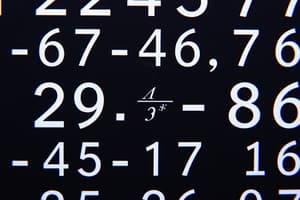Podcast
Questions and Answers
When rounding the number 4,276 to the nearest hundred, what is the result?
When rounding the number 4,276 to the nearest hundred, what is the result?
- 4100
- 4300
- 4000
- 4200 (correct)
When rounding the number 5,834 to the nearest ten, what is the result?
When rounding the number 5,834 to the nearest ten, what is the result?
- 5,840 (correct)
- 5,830
- 5,823
- 5,835
What is the result of rounding the number 12,499 to the nearest thousand?
What is the result of rounding the number 12,499 to the nearest thousand?
- 12,400
- 12,500 (correct)
- 12,000
- 13,000
What is the correct rounded value of 67,412 to the nearest hundred?
What is the correct rounded value of 67,412 to the nearest hundred?
Identifying which of these numbers rounds to 800 when rounding to the nearest hundred is essential. Which one is correct?
Identifying which of these numbers rounds to 800 when rounding to the nearest hundred is essential. Which one is correct?
Flashcards
What is Rounding?
What is Rounding?
Adjusting a number to a nearby place value to make it easier to work with.
What is Place Value?
What is Place Value?
The value a digit holds based on its position in a number (ones, tens, hundreds, etc.).
How to Round Up?
How to Round Up?
If the digit to the right is 5 or greater, increase the target digit by one.
How to Round Down?
How to Round Down?
Signup and view all the flashcards
Why is Rounding Useful?
Why is Rounding Useful?
Signup and view all the flashcards
Study Notes
Rounding Multi-Digit Whole Numbers
- Rounding involves adjusting a number to a nearby specified place value, making it easier to work with.
- Place value understanding is crucial for rounding, as it helps identify the digits relevant to each rounding place (units, tens, hundreds, etc.).
- To round a number, look at the digit immediately to the right of the target place value:
- If it's 5 or greater, the target digit is increased by one.
- If it's less than 5, the target digit remains the same.
- Example: Rounding 4672 to the nearest hundred involves looking at the digit in the tens place (7):
- Since 7 is greater than 5, round 4672 up to 4700.
- Rounding can be applied to any place value: thousands, hundreds, tens, or ones, allowing for flexibility based on context.
- Rounding is commonly used in everyday math situations, such as estimating costs, distances, or measurements.
Rounding Multi-Digit Whole Numbers
- Rounding involves adjusting a number to the nearest specified place value.
- Fundamental understanding of place value is crucial; each digit holds a specific value based on its position.
- Rounding contexts apply to any place, including units, tens, hundreds, etc.
Key Steps for Rounding
- Identify the place value to which you are rounding.
- Look at the digit immediately to the right of that place value.
- If that digit is 5 or greater, round up by increasing the target digit by one.
- If the digit is less than 5, retain the target digit and change all digits to the right to zero (or remove them).
Examples of Rounding
- Rounding 473 to the nearest ten yields 470.
- Rounding 6,582 to the nearest hundred results in 6,600.
- Rounding 54,329 to the nearest thousand leads to 54,000.
Applications of Rounding
- Useful in estimating sums, differences, and multiplication in daily calculations.
- Rounding helps simplify complex numbers for easier interpretation and comparison.
- Often encountered in real-life scenarios such as budgeting, measurements, and statistics.
Studying That Suits You
Use AI to generate personalized quizzes and flashcards to suit your learning preferences.




